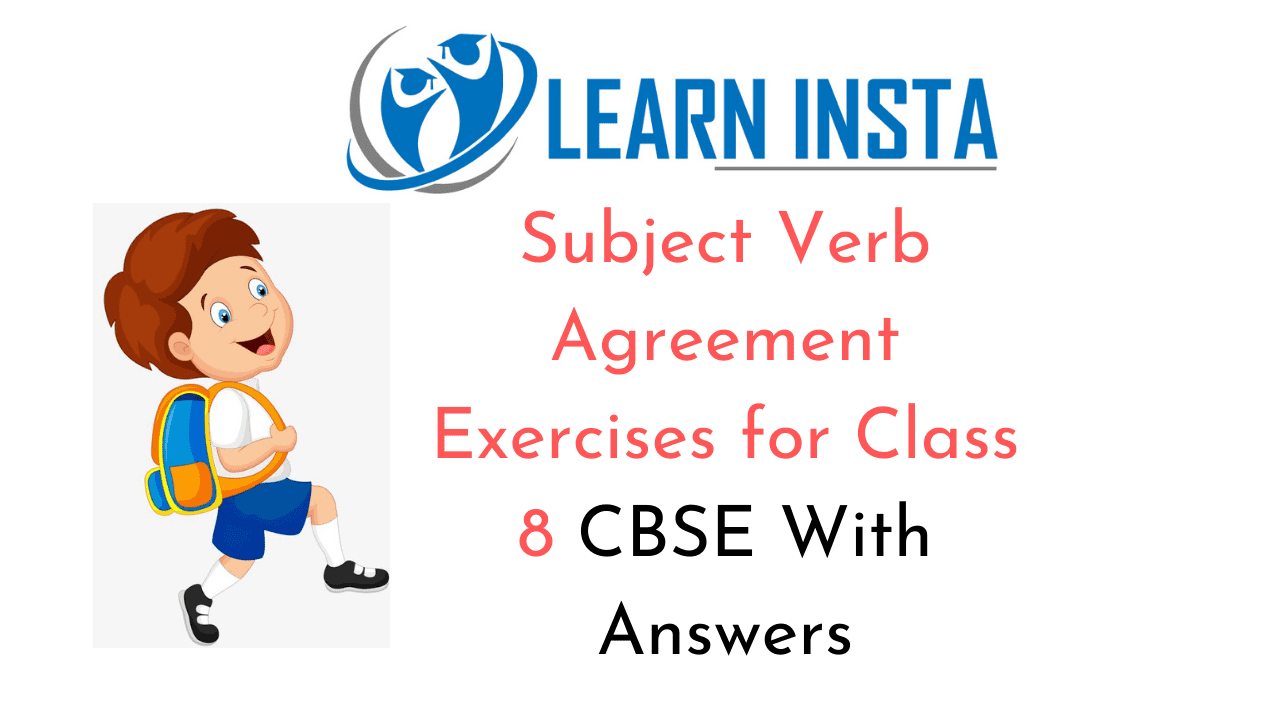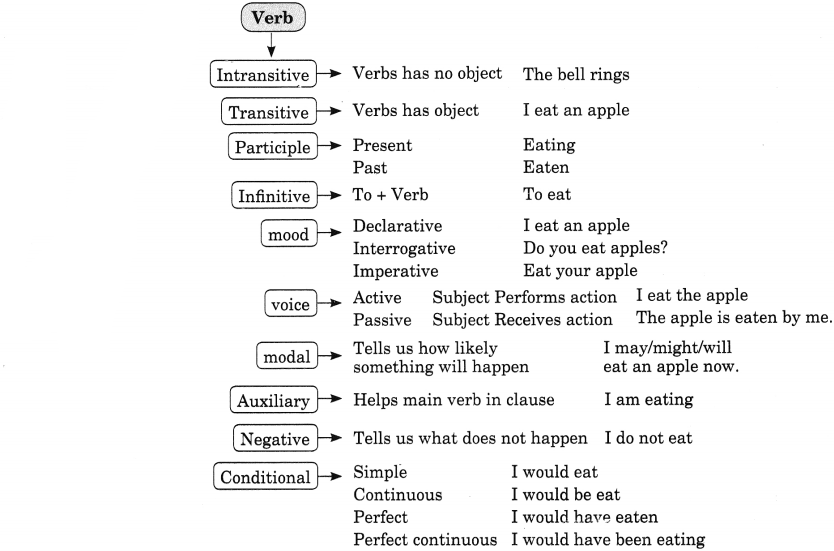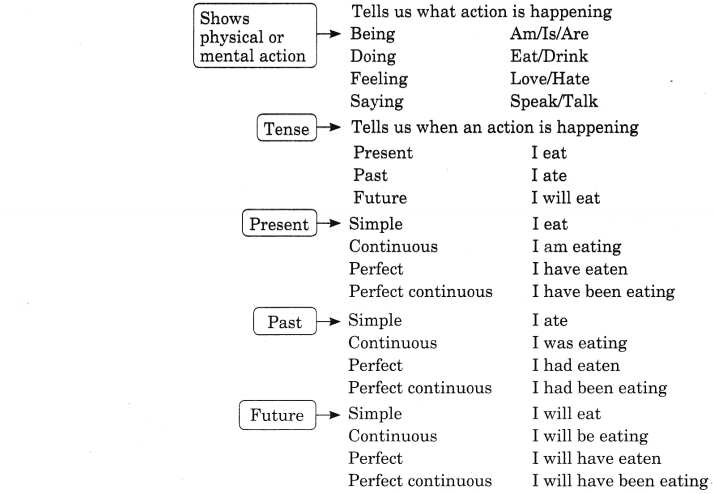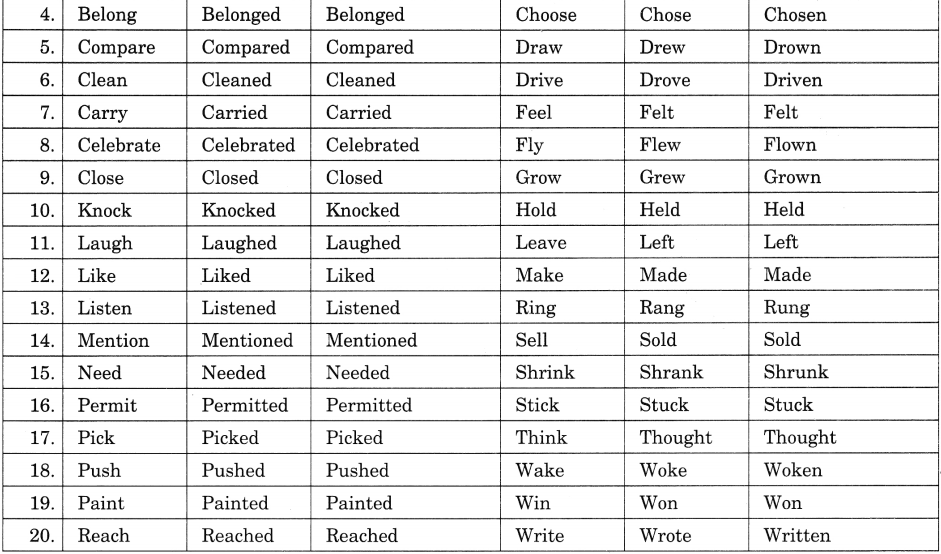
Mom, can I run to the park?
I jumped over the puddle.
You Swam fast in the race.
What do the words that are capitalized all have in common? They are verbs!
A verb is a main part of speech that is often used to describe or indicate an action. Sentences are not complete without a verb. Here are some examples: jog, stop, hear, call, explore and believe.
This grammar section explains English Grammar in a clear and simple way. There are example sentences to show how the language is used. NCERT Solutions for Class 8 English will help you to write better answers in your Class 10 exams. Because the Solutions are solved by subject matter experts.
Subject Verb Agreement Exercises for Class 8 CBSE With Answers Pdf
Fundamentals:
- Every sentence says something about a person or thing.
- The part of a sentence that names the person or thing is called Subject or the part, which gives us information about the Subject is called Predicate.
- The subject of a sentence thus has a close relation to what is being said in the Predicate.
- The form of the verb should be in direct relation to the number and person of the Subject.
Rules for Subject-Verb Agreement
- The verb must agree with the subject in Number and Person.
- If the subject is singular, the verb should also be singular.
- If the subject is plural, the verb should also be plural.
Example:
He is a good boy. (singular subject, singular verb)
They are good players (plural subject, plural verb)
When two or more singular subjects are joined together by ‘and’, plural verb is used.
Example:
- Ram and Sham are playing a game.
- He and his friends have arrived.
If two singular nouns refer to the same person or thing, the verb must be singular.
Example:
- My friend and benefactor has come.
- By the death of Gokhale a great statesman and patriot was lost to India.
It should be noted that the article is used only once if the two nouns refer to the same person. If different persons were referred to, the article would be used before each noun and the verb would be plural.
Example:
- The director and writer of movie received on award.
- The orator and the statesman are dead.
If two subjects together express one idea, the verb will be in the singular.
Example:
- Early to bed and early to rise makes a man healthy, wealthy and wise.
- Slow and steady wins the race.
If singular subjects have ‘each’ or ‘every’ before them, the verb is usually singular.
Example:
- Every man, woman and child was lost.
- Each day and each hour brings its duty.
Two or more singular subjects connected by ‘or’, ‘nor’, ‘either’, ‘neither’ or ‘nor’ take a verb in the singular.
Example:
- Neither Hari nor Ravi has come.
- No nook or corner was left unexplored.
When the subjects joined by ‘or’, ‘nor’ are of different numbers, the verb must be plural, and the plural subject must be placed next to the verb.
Example:
- Hari or his brothers have done this.
- Either the boy or his parents have gone there.
When the subjects joined by ‘or’, ‘nor’ are of different persons, the verb agrees in person with the one nearest to it.
Example:
- Either he or I am mistaken.
- Neither you nor he is to blame.
A collective noun takes a singular verb when the collection is thought of as a whole.
Example:
- The counsel has chosen its president.
- The fleet has set sail.
It should however be kept in mind that if the individuals of which the collective noun is composed of are thought of, it can take a plural verb.
Example:
- The military work called out.
- The crew were taken prisoners.
Some nouns which are plural in form, but singular in meaning, take a singular verb.
Example:
- The news is true.
- Physics is a branch of natural science.
When a plural noun comes between a singular subject and its verb, the verb used is singular in form.
Example:
- Each of the sisters is clever.
- A variety of objects charms the eye.
- The quality of the mangoes was not good.
Words joined to a singular subject by with, together with, in addition to or as well as are parenthetical and therefore do not affect the number of verb.
Example:
- The chief, with all his men, was killed.
- Justice as well as mercy, allows.
When the subject of the verb is a relative pronoun, care should be taken to see that the verb agrees in number and person with the antecedent of the relative.
Example:
- I, who am your friend, will guard you interest.
- You, who are my friend, should not worry me.
The title of a book, play, story, musical composition and the name of a country, even though plural in form take a singular verb.
Example:
- Sons and Lovers is an interesting novel.
- The United States of America is a developed country.




Subject Verb Agreement Exercises Solved Examples for Class 8 CBSE
Question 1.
Complete the following sentences using an appropriate tense form.
(i) I ___________ here since morning.
(a) am waiting
(b) have been waiting
(c) had been waiting
Answer:
(b) have been waiting
(ii) It ___________ raining since yesterday.
(a) hasn’t stopped
(b) didn’t stop
(c) hadn’t
Answer:
(a) hasn’t stopped
(iii) I ___________ interested in metaphysics.
(a) am always
(b) have always been
(c) had always been
Answer:
(b) have always been
(iv) They ___________ in this street for twenty years.
(a) have lived
(b) have been living
(c) Either could be used here
Answer:
(b) have been living
(v) I ___________ to a foreign country.
(a) am never gone
(b) have never been
(c) was never gone
Answer:
(b) have never been
Question 2.
State whether the verbs underlined in the sentences given below have been used in their transitive or intransitive forms.
(i) The ants fought the wasps.
(ii) Some ants fight fiercely.
(iii) Ring the bell, Rama.
(iv) The ship sent rapidly.
(v) This horse never kicks.
Answer:
(i) Transitive
(ii) Intransitive
(iii) Transitive
(iv) Intransitive
(v) Intransitive
Question 3.
Underline the verbs in the sentences given below and state whether they are in the Active or Passive Voice.
(i) Sita loves Savitri.
(ii) The wall is being built by the mason.
(iii) Some boys were helping the wounded man.
(iv) The man killed the snake.
(v) The food prepared by Asha was eaten by Ram.
Answer:
(i) Sita loves Savitri. – (Active)
(ii) The wall is being built by the mason. – (Passive)
(iii) Some boys were helping the wounded man. – (Active)
(iv) The man killed the snake. – (Active)
(v) The food prepared by Asha was eaten by Ram.
Prepared – (Active)
was eaten – (Passive)
Subject Verb Agreement Exercises Practice Examples for Class 8 CBSE
Question 1.
Choose the following sentences using an appropriate tense form.
(i) Where ____________ the sun rise?
(a) does
(b) do
(c) had
(ii) I ____________ Susie Monday
(a) see
(b) am seeing
(c) Either could be used here
(iii) We ____________ the monkey on the 15th.
(a) are needing
(b) will need
(c) Either could be used here
(iv) “There is the doorbell.’ ‘I ____________.
(a) am going
(b) will go
(c) Either could be used here
(v) She ____________ half of her time traveling.
(a) spends
(b) is spending
(c) Either could be used here
Question 2.
Match the columns to makes sentences.
| Column A | Column B |
| (i) Everyone laughs | (a) into a cow. She wasn’t looking where she was going |
| (ii) I will get | (b) of a dosa and a glass of buttermilk. |
| (iii) I will start work | (c) Off at the next shop. |
| (iv) Freni ran | (d) at Rinki’s jokes |
| (v) Which boy paid | (e) of the play? |
| (vi) Did you come | (f) with all the patients who are waiting? |
| (vii) Mala’s lunch consisted | (g) on my Maths project today. |
| (viii) What did you think | (h) for the ice cream? |
| (ix) Will you be able to deal | (i) across my compass when you cleaned the cupboard. |